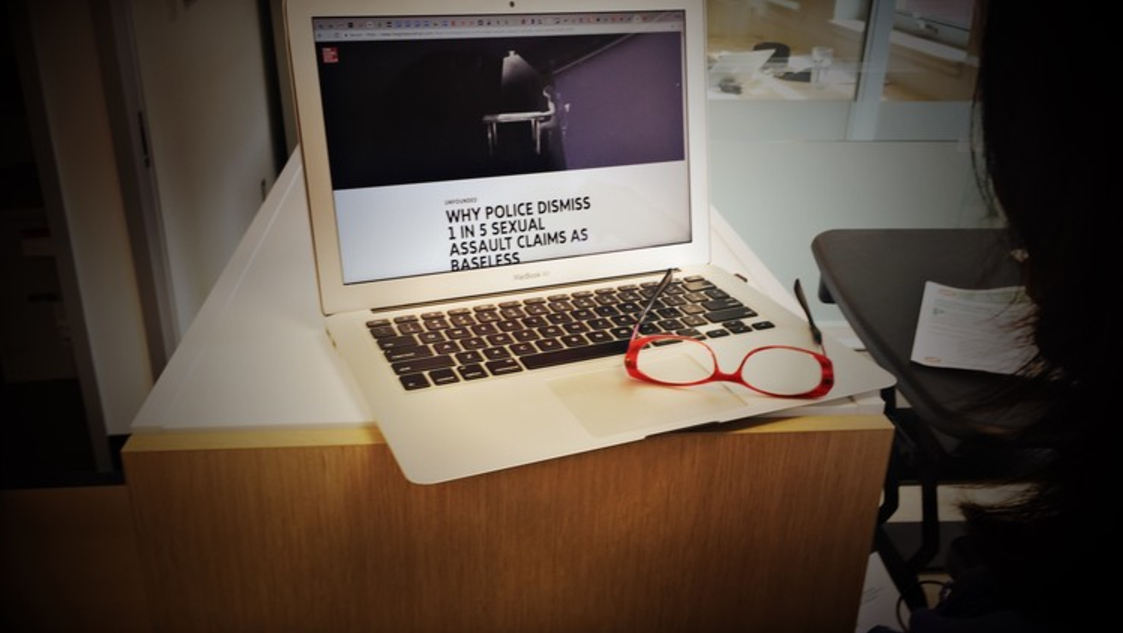By Yasmin Jiwani for The Conversation Canada
President Donald Trump took his battle with the news media to a new level when he tweeted a doctored video of himself wrestling someone with a CNN logo superimposed over their face and then rebranding the cable news channel FNN – the Fake News Network.
While there is much to critique about the news media in this age of “post-truth” within a landscape dominated by a handful of media conglomerates, we need the press to hold our leaders and institutions accountable.
Locally, when the occasion calls for it, we should laud the press. The Globe and Mail’s series Unfounded is one of those instances.
The power of the press cannot be underestimated, both in terms of the positive and negative impact of news coverage. The Globe‘s Unfounded series worked in a progressive way to bring under reported issues to light. Focusing on cases of sexual assault reported to but dismissed by the police, Unfounded showcases the power of the press to effect social change.
Based on a 20-month investigation of police records of unfounded cases, the series, spearheaded by journalist Robyn Doolittle, revealed that one in five of every sexual assault cases reported to the police is documented and dismissed as unfounded. Doolittle was able to gather this data after sending hundreds of freedom of information requests to police jurisdictions across the country. What she created is more than just a shocking statistical profile of such cases.
Data + personal stories = powerful combination
The series, which recently won a 2017 Data Journalism Award for “using data to expose systemic failure,” represents a stellar example of investigative journalism. Doolittle augmented the statistical analysis with stories that she gathered directly from women who had been assaulted and whose complaints had been dismissed by the police.
However, it is the reporting of the series and its presentation in the months following the investigation that is also noteworthy. Rather than bury the story in the back pages, the Globe headlined it on the front page, not once but regularly, throughout the series.
I am a long-time researcher of Canadian media and I believe this is in stark contrast to the usual reporting of newsworthy stories. Generally they appear once or twice, or are embedded in the coverage. They disappear not only from the newspaper but also from the collective memory of the readers. Repetition, in this instance, worked to keep the story alive in the public imagination, and also in the minds of policymakers.
Added to this, the Globe inserted a compelling and personal angle to the reporting. On a daily basis, it profiled an individual story of a woman whose case was unfounded by the police. This insertion worked to humanize the story. More than that, the publishing of such stories, on a gradual basis, profiled daily, also worked to keep the story alive and in the minds of the audience.
Thus, the structural angle (the statistics), coupled with the stories themselves, both collectively and individually, along with a regular publishing schedule, captured the complexity and nuances in a manner that was highly effective.
Policy-makers took note
It was not surprising then to see the rippling changes that occurred following the publication of the series. Not only did different police forces commit to reviewing the unfounded cases in their files, but Statistics Canada also committed to collecting data from different areas of the country. Politicians also promised to allocate more funding to gender-based violence and to hammer out a consistent strategy for dealing with sexual assault cases.
Recently, Ottawa police made an arrest based on information revealed in the Unfounded series.
https://twitter.com/robyndoolittle/status/877866229599531008
The Globe’s Unfounded series reveals the power of investigative journalism. The paper’s current series on physicians’ abuse of the medical system through double dipping promises to be just as revelatory and hopefully, game changing. If the Globe were to tackle issues of racism, Islamophobia and other such forms of violence with this innovative style of journalism it would fulfil the proper role of news — to inform and educate the citizenry.
Still, one cannot evade the reality of the contemporary media landscape. With the increasing prevalence of social media as the conduit through which most news is consumed, series such as Unfounded don’t often get the air time they deserve. Instead, condensed bite-sized pieces win the day and long-form journalism remains a pastime of the few.
This story was originally published on The Conversation Canada, and is republished here with the editor’s permission.

